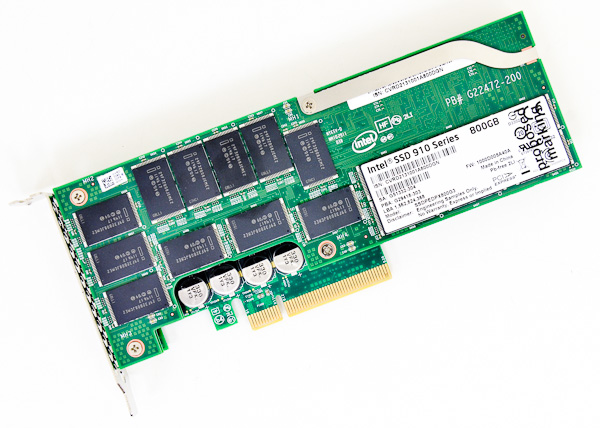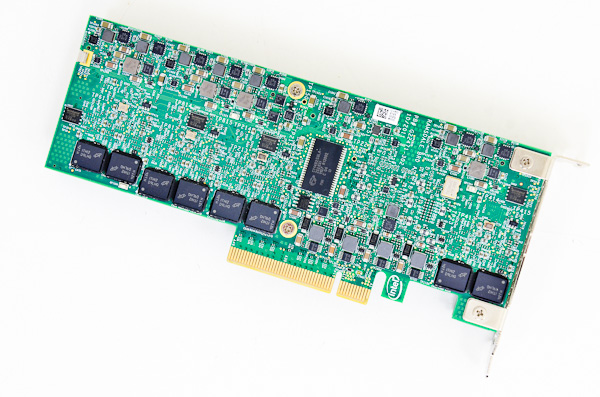The Intel SSD 910 Review
by Anand Lal Shimpi on August 9, 2012 1:00 PM EST- Posted in
- Storage
- SSDs
- Intel
- Intel SSD 910
Final Words
From a performance perspective, the Intel SSD 910 is an absolute beast. If you take into account encrypted or otherwise incompressible data performance, the 800GB 910 is easily the fastest SSD we've ever tested. The performance loss for the 400GB drive makes it a bit more normal, but it's still among the best. The only thing to be concerned about with the 910 is its poor low queue depth, small file write performance. If your workload is dominated by 2KB (or smaller) writes then the 910 isn't going to be a great performer and you'd be much better off with a standalone 2.5" drive. For all other workloads however, the 910 is great.
Pricing is also extremely competitive with other high-end enterprise PCIe offerings. Intel comes in at $5/GB for its top of the line enterprise SSD, despite the 710 being introduced at over $6 per GB. If you really want to get nostalgic, the old X25-E launched at over $15/GB. The cost per GB is much lower if you take into account how much NAND Intel is actually putting on board the 910. With 56 x 32GB 25nm MLC-HET die on a single 800GB 910, you're talking about around $2.23 per GB. I'd even be interested in seeing Intel offer a higher capacity version of the 910 with less endurance for those applications that need the performance but aren't tremendously write heavy.
Of course there's Intel's famed reliability to take into account. All of the components on the 910 are either widely used already or derived from SSDs that have been shipping for years. There's bound to be some additional firmware complexity but it's nothing compared to doing a completely new drive/controller. Most of the server shops I've worked with lately tend to prefer Intel's 2.5" SSDs, even though there are higher performing alternatives on the market today. The 910 simply gives these folks an even higher end option should their customers or workloads demand it.
My only real complaint is about the inflexibility on the volume side. It would be nice to be able to present two larger volumes (or maybe even a single full capacity volume) to the OS rather than four independent volumes on an 800GB 910. Some VM platforms don't support software RAID and at only 200GB per volume capacity could become an issue. You really need to make sure that your needs are properly lined up with the 910 before pulling the trigger.
As a secondary issue, although I appreciate the power of Intel's SSD Data Center Tool, I would like to see something a bit easier to use. Not everyone wants to grok hexadecimal temperature values (although doing so wins you cool points).
Overall I'm pleased with the 910. It's (for the most part) a solid performer, it's competitively priced and it should last for a good while. If you're space constrained and need to get a lot of local IO performance in your server, Intel's SSD 910 is worth considering.












39 Comments
View All Comments
Lazarus52980 - Thursday, August 9, 2012 - link
Wow, fantastic review. Thanks for the good work Anand.quiksilvr - Thursday, August 9, 2012 - link
Considering the hefty price on these devices, anything short of AES-256 in this day and age is unacceptable (yes I know you can do software encryption, but hardware accelerated is much more secure)prime2515103 - Thursday, August 9, 2012 - link
I'm confused. Isn't AES-256 the same whether it's done in hardware or software? I thought hardware encryption just performed better (encrypts/decrypts faster).Rick83 - Thursday, August 9, 2012 - link
AES-256 is no safer than AES-128, according to somewhat recent cryptanalysis on the algorithms.madmilk - Thursday, August 9, 2012 - link
Hardware acceleration is probably for performance, even AES-NI can't keep up with multiple PCIe SSDs.And yeah, AES-256 easier crack than AES-128 now. Not that it matters, with computational complexity still at what, 2^99?
It's much easier to just kidnap the sysadmin than attack crypto.
JPForums - Friday, August 10, 2012 - link
Since you didn't mention which attack you are referring to, I'm going out on a limb and assuming you are talking about the related key attacks on the full AES256 / AES192. I don't know of any other attacks that work on all 14 / 12 rounds. You should be aware that while such an attack is widely considered impractical, it isn't even possible under many circumstances. You need some up front data that you can't always get. To keep in relation to this article, I'll limit my scope to on the fly encryption software as it is closely related to the encryption implemented on this device. Several on the fly encryption packages are known to be immune to this kind of attack (I'll single out TrueCrypt as a popular open source package that isn't vulnerable to related key attacks). As long as you are using a properly programmed encryption package for your full disk encryption, AES-256 is still "more secure" than AES-128.
That said, if you actually calculated the amount of time it takes to brute force AES-128, you'll find that PCs and possibly humanity will have become a long forgotten relic of the past. Of course, processing power changes, but not that quickly. A bigger concern would be attacks that successfully bring the set of keys down to a manageable level. For this issue, diversity is probably more important than bit length, assuming the brute force key set is sufficiently large (I.E. 2^128).
Troff - Thursday, August 9, 2012 - link
I always end up needing to be able to communicate directly with each "drive", which is usually problematic through a raid controller and software raid is invariably faster and in every case I've tried so far much, much faster.Araemo - Thursday, August 9, 2012 - link
Isn't this necessary for trim anyways? If the OS can talk to each 'drive', trim should work, and performance will stay good, right?web2dot0 - Thursday, August 9, 2012 - link
Hey Anand,Shouldn't FusionIO cards be part of this comparison? It will most likely destroy the 910.
happycamperjack - Thursday, August 9, 2012 - link
http://hothardware.com/printarticle.aspx?articleid...Not according to this article. And ioDrive compared in this article is actually about 2x the price of either intel 910 or z-drive r4.